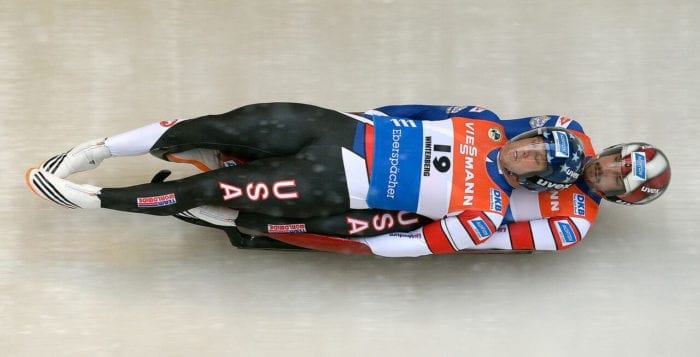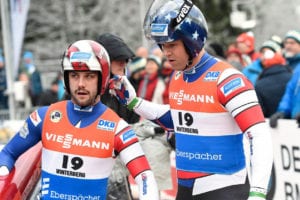They grew up an ocean, and a few months, apart. They spoke different languages, lived in families of different sizes, and competed at high levels in sports from different seasons.
And yet Huntington Station’s Sgt. Matt Mortensen, a Winter Olympic soldier-athlete with Team USA who competes in the luge, and Alex Duma, a sports chiropractor in New York, have been dating for close to two years.
The world of sports provides common ground for these two 32-year-olds. Duma grew up to become a Romanian women’s national swimming champion and an All-American swimmer.
Mortensen, despite living his early years on the relatively flat terrain of Long Island, dedicated his considerable athletic energy to a sport his father Jerry introduced him to when the company where he worked, Verizon, was sponsoring a luge event.
Mortensen and Duma met when she was on volunteering at Lake Placid Olympic Training Center.
He tried to ask her out for a drink and she turned him down because she didn’t want to consider dating someone she might treat as a patient.
Several months later, however, she relented when she knew he wouldn’t consult her professionally.
Once they started dating in earnest, her experience as an athlete helped prepare her for the travels, the dedication to training — and the competition.
“I understand him really well,” she said. “I’ve been an athlete myself and I do travel with athletes. I understand his lifestyle.”
That lifestyle brings challenges that would be difficult for people who weren’t born some 5,000 miles apart. Indeed, as a member of the Army World Class Athlete Program, Mortensen ventures around the globe routinely, competing in World Cup competitions.
Since he was 12, Mortensen learned most of his middle school and high school lessons from work sent from St. Dominic’s in Oyster Bay. He often missed celebrating his December birthday with his family because it fell during the winter luge season.
The time on the road, however, helped him grow up more rapidly and, as it turned out, gave him the opportunity to learn other cultures earlier than many of his American contemporaries.
The months he spent in Europe “helped bridge the cultural gap,” Duma said. It helped him “understand my European culture.”
At the same time, Duma came to the United States when she was 19, so she feels that “a lot of what I am is due to the American culture.”
Duma admires Mortensen’s relentless efforts to improve and compete. She has watched how he continues to work out after the season ends, even when the workouts are not required.
“He’ll go above and beyond the extra step,” she said.
As for their families, Duma grew up as an only child. On another continent, Mortensen grew up with four brothers and two sisters, in a family of nine.
“They are an amazing big family,” Duma said. “I feel so blessed to have been invited to family events,” which include Christmas and Easter.
Duma appreciates the noise, the dogs, little kids and the constant commotion, which is a marked contrast from her life in a small family, where it was “too quiet.”
Borrowing an oft-quoted line from the movie “Jerry Maguire,” Mortensen said Duma “really completes me.”
Mortensen suggested that Duma stay behind and continue to work while he was in PyeongChang. In South Korea, he finished fourth in the luge team relay, a tenth of a second behind the Austrian team for bronze. He wanted her to save up her vacation time so the athletic couple could travel on a planned trip to Hawaii. During the games, the two of them speak by FaceTime and Whatsapp.
Ultimately, what makes the relationship work, Duma said, is that her Olympic boyfriend is “such a good communicator. He’s amazing at that.”






